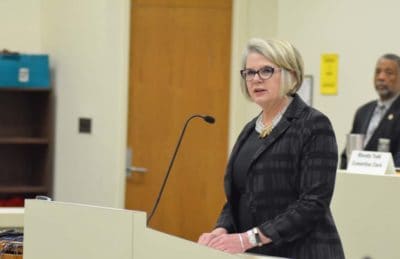Greetings from the University of North Carolina system,
Mobility, accountability, and the public good
“Pleased but not satisfied” has been my refrain for the past few weeks as we’ve kicked off the 2018 State of the University Tour. It’s how I describe our outlook: we are a strong, thriving System with a hunger for seizing the opportunities ahead.
As a System, we’ve had significant growth in our graduation rate, external research funding, overall enrollment, low-income student access, and critical workforce credentials. All while tuition is flat or falling this year at every institution.
But there’s much more to do to meet our state’s rising challenges, and during this tour I’ve been talking about three big issues in front of us.
How do we provide opportunity and strengthen economic mobility for every North Carolinian?
How do we set higher expectations for ourselves and hold ourselves accountable for meeting those expectations?
And how do we uphold the University’s public mission by promoting healthy public discourse, modeling fair-minded public service, and advancing the public good?
Our future as a state will depend on how well we strengthen our college-going culture. To succeed, we must build a culture that places education beyond high school within the reach of every North Carolinian, whether that’s a four-year degree, a two-year degree, or a range of alternatives from apprenticeship programs, to college credit for military service, to on-the-job training that counts toward a degree or a certificate.
State of the University tour around the state
The State of the University tour continued on Monday at Fayetteville State University with a student roundtable and an address at the Airborne and Special Operations Museum in downtown Fayetteville. A stop in Pembroke on Friday will continue the tour with additional stops through April and May.
Thanks to all the members of the Board of Governors, and state and institutional leaders who joined for our first two stops at UNC Charlotte’s Center City Campus and at UNC Wilmington’s Fisher Student Center. You can check out remarks and video from Charlotte, and remarks and video from Wilmington.
There’s incredible work happening at all of our institutions, some of which is highlighted in op-eds in the North State Journal, Wilmington Star News, and Fayetteville Observer.
March Board of Governors meeting
In addition to hosting a tour stop, UNC Wilmington’s team did double duty last month, also welcoming the UNC Board of Governors for their March meeting, which saw the adoption of 2018-2019 tuition and fees and our 2018 Legislative Short Session priorities. You can watch the full Board meeting online.
Thanks to the hard work from the Budget and Finance Committee, led by Chairman Sloan, our Boards of Trustees, and the staff at all our institutions, we’ve held tuition flat at all our institutions and dropped tuition to just $500 per semester at UNC Pembroke, Western Carolina University, and Elizabeth City State University.
That remarkable drop is only possible because of the significant commitment by the legislature and the NC Promise program, which is creating momentum, optimism, and a sharp spike in applications at all three institutions.
The legislature’s strong support, through NC Promise as well as through the strongest budget in a decade, means we are positioned well as 2018 progresses.
Which is why we’ve focused our modest legislative short session agenda on a few key requests, including funding for our data modernization program. Aligning and reforming our clunky legacy data systems is crucial if we are to truly understand our operation and answer the questions policymakers need to know to do their job well and serve our students and all North Carolinians.
MyFutureNC Commission
Another UNC Board of Governors’ priority is the myFutureNC Commission, about which I had the opportunity to speak with the Joint Legislative Education Oversight Committee last week. You can read my full remarks here.
The Legislator’s response and questions underscored the importance of this statewide process. We must set a goal with broad buy-in, that lays out how many North Carolinians need some form of education beyond high school.
Work from Rebecca Tippett, head of UNC’s Population Center, and others has helped quantify how many students had aspirations for higher education but who drop out at various points along the way. What’s clear is that the status quo is unacceptable. We lose too much talent because of the barriers our system creates.
One barrier that we’re addressing across the System and our community colleges is math proficiency. Last week, 35 representatives from across 16 of the University’s institutions and the state’s community colleges met in Chapel Hill to launch the UNC Math Pathways project.
Internal data show that some of our institutions have drop, failure, incomplete, or withdrawal rates in their gateway math courses as high as 48 percent. That must change and our two-year pathways project will help redesign curriculum and supports to help do so.
More broadly, the myFutureNC Commission’s next formal meeting is at SAS in Cary in June. In the meantime, a series of listening sessions is taking place across the state over the next few months.
Looking ahead to May
It’s almost Commencement season. Next month, we’ll celebrate nearly 35,000 new UNC graduates and hear from commencement speakers from across the state and nation, including Senator Richard Burr, who will speak at UNC Pembroke.
I’m honored to be giving the address at another NC Promise institution, Elizabeth City State University, and I look forward to spending time with the latest set of Viking graduates.
As always, reach out with any questions or suggestions at president@northcarolina.edu.
Editor’s note: This blog was originally published on the University of North Carolina System website.
Recommended reading


